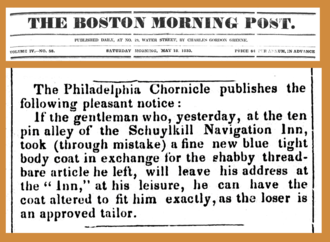Tongue-in-cheek

Tongue-in-cheekis anidiomthat describes a humorous orsarcasticstatement expressed in a serious manner.
History
[edit]The phrase originally expressed contempt, but by 1842 had acquired its modern meaning.[1][2][3]Early users of the phrase includeSir Walter Scottin his 1828The Fair Maid of Perth.
The physical act of putting one'stongueinto one'scheekonce signifiedcontempt.[4]For example, inTobias Smollett'sThe Adventures of Roderick Random,which was published in 1748, the eponymous hero takes a coach toBathand on the way apprehends ahighwayman.This provokes an altercation with a less brave passenger:
He looked back and pronounced with a faltering voice, 'O! 'tis very well—damn my blood! I shall find a time.' I signified my contempt of him by thrusting my tongue in my cheek, which humbled him so much, that he scarce swore another oath aloud during the whole journey.[5]
The phrase appears in 1828 inThe Fair Maid of PerthbySir Walter Scott:
The fellow who gave this all-hail thrust his tongue in his cheek to somescapegraceslike himself.
It is not clear how Scott intended readers to understand the phrase.[1]The more modernironicsense appeared in the 1842 poem "The Ingoldsby Legends"by the English clergymanRichard Barham,in which a Frenchman inspects a watch and cries:
'Superbe! Magnifique!'/ (with his tongue in his cheek)[1]
The ironic usage originates with the idea of suppressed mirth—biting one's tongue to prevent an outburst of laughter.[6]
See also
[edit]References
[edit]- ^abcOwens, Gene (4 December 2007)."'Tongue in cheek' is cut-and-dried phrase ".The Oklahoman.Phrases.org. Archived fromthe originalon 2021-02-07.
- ^Chay, H.,Contrastive metaphor of Korean and English revealed in 'mouth' and 'tongue' expressions
- ^Zoltan, I. G. (2006). "Use Your Body".Philologia.
- ^Ayto, John (2009),From the Horse's Mouth,Oxford University Press,ISBN978-0-19-954379-3
- ^Smollett, Tobias George (1780),The adventures of Roderick Random
- ^Marshallsay, Nick (2005),The body language phrasebook,Collins & Brown,ISBN978-1-84340-304-3
External links
[edit] The dictionary definition oftongue-in-cheekat Wiktionary
The dictionary definition oftongue-in-cheekat Wiktionary
